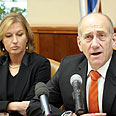
The beneficiary: Prime Minister Ehud Olmert seems to be one of the people who stand to benefit from Kadima Chairwoman Tzipi Livni's decision to call for general elections.
Livni decided to opt for calling for elections on Saturday, after her attempts to form a new government, and the intense coalition negotiation which accompanied them, appeared to be deadlocked.
She is expected to notify President Shimon Peres of her decision later Sunday.
Olmert now stands to preside as the prime minister over a transitional government for the remaining 111 days left until the elections, and is most likely to try and use the time to propel political moves, as well as various financial ones, aimed at preventing the global financial crisis from harming Israel's economy.
Olmert will apparently use the four months he has left in office to push motions pertaining to the peace process with both the Palestinians and the Syrians. One of the options reportedly being discussed is calling a meeting with US Secretary of State Condoleezza Rice and Palestinian President Mahmoud Abbas, for later November, to mark a year since the Annapolis Summit.
A major breakthrough in the negotiations with Syria seems unlikely at this time, as Damascus awaits the results of the US presidential race, and now of the Israeli elections as well, to decided on its next move.
Best laid plans
Olmert may try to bring the revised State Budget to another Knesset vote. If he chooses not to do so, the government would use the guidelines set by the 2008 Budget until such time that a new government is formed and approves the next State Budget.
Plans aside, Olmert's transitional government has limited leeway: Shortly after Olmert announced his resignation, Attorney General Menachem Mazuz issued a brief stating that while Olmert's resignation did not turn the government into a transit one per se, it – and its ministers – should still exercise due caution in any decisions made pending the elections.
"This unique situation compels the current government and its ministers to exercise due caution in their actions," said the brief.
Sunday's cabinet meeting stands to be held under the banner of Livni's decision to call for elections. Monday will see Olmert speak at the Knesset's winter session opening. His speech is expected to clarify many of his political intentions for the time remaining until the elections.
The Knesset's winter session is expected to be shorter than usual. According to Basic Law: The Government, the Knesset must wait 21 days until it officially declares that general elections will be held within 90 days.
The three-week period is made to see whether or not any of the Knesset members can rally enough support from their peers in order to try and from a new government in Livni's place. The current political climate sees slim chances of that happening.















